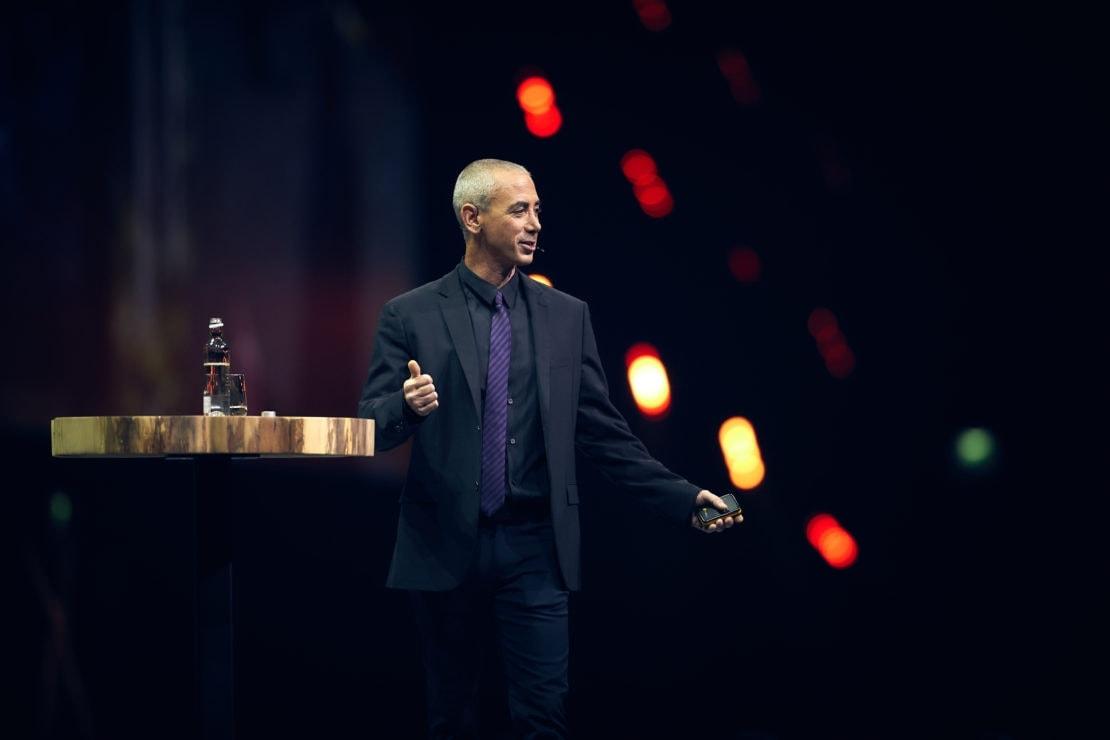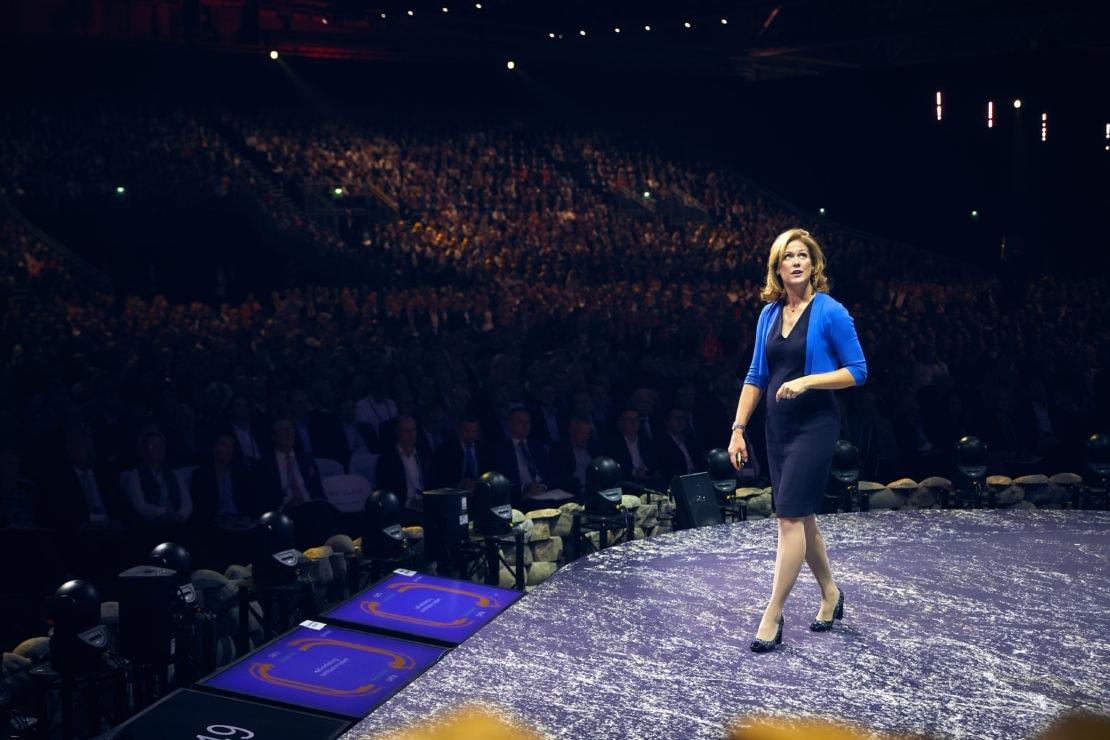20Nov2018
Author and entrepreneur Steven Kotler is fascinated by the concept of peak performance. As co-founder and director of research of the Flow Genome Project, he works to help people and organizations maximize their potential, their work output, and their success.
“I’m interested in extreme innovation,” he told attendees at the Nordic Business Forum 2018 in Helsinki, “and what it takes to do the impossible,” because, “impossible has a formula.”
According to Kotler, we have entered an era of unprecedented and exponential growth. Established companies are being disrupted constantly as technological innovation accelerates. Organizations and the people in them must adopt exponential thinking to harness these technologies and tackle world-class challenges – be it eradicating poverty, defeating malaria, or conquering space. Organizations that succeed in doing this will become the game-changing, billion- dollar companies of tomorrow. And most of these firms, Kotler noted, haven’t even been born yet.
The future is exponential
Kotler showed enthusiasm for the disruptive power of exponential growth, which he used Moore’s Law to illustrate. Moore’s Law shows that the computing power of microchips has been doubling roughly every 18 months for the last 50 years. “Moore’s Law is the reason that the smartphone in your pocket is a thousand times cheaper, a million times smaller, and a million times faster than a supercomputer from the 1970s,” he said. But the most fascinating thing is that this growth is not slowing down but rather accelerating with extraordinary consequences. “Five years from today, the average computer that you buy at the store will have the same computing power as the human brain,” Kotler stated.
Technology is expanding exponentially in countless other sectors, too. From communication to robotics, from medicine to biotechnology, from 3D printing to networks, once IT is integrated within a new sector, it begins behaving according to Moore’s Law, Kotler said, and this is where its parabolic growth path begins. The results affect everyone. Computing power in biotechnology applications is doubling every four months, for instance. The result, Kotler outlined, is that “every day we are alive, we gain five hours in life expectancy – even without a minute spent at the gym.”
A new era of business models
While the industrial revolution was the result of adding power to mechanical processes, the AI revolution is the product of adding computing intelligence to industrial applications, Kotler pointed out. This is what turned simple phones into Apple smartphones, or stereos into Amazon Alexas. This trend is subverting corporate hierarchies and generating new business models, not every decade, but yearly.
One of these models is the Distributed Autonomous Organisation (DAO), a blockchain-based entity with no employees, no bosses, and no managerial structure. The executive decision-making process, once an exclusively human domain, is automated by self-managing algorithms. A fleet of taxis managed by a DAO, therefore, would decide when to do repairs, replace cars, and change pricing – autonomously.
Such new business models have unleashed exponential wealth creation. The unicorn club, once encompassing the handful of startups that had reached a $1 billion-plus valuation, is getting crowded. “What used to be a 20-year milestone is now being achieved in the space of only 2.4 years on average,” Kotler said.
The result is that established incumbents, like Kodak and Blockbuster, for example, have been wiped out in record time by new business models – the first by digital imagery and the second by Netflix. Unsurprisingly, Kotler noted, corporate longevity for Fortune 500 companies has plummeted from 68 years in the 1930s to only 14 years today.
Unleashing exponential growth with user interfaces
“The introduction of a user-friendly interface is what propels a new technology towards mass adoption on a global scale,” Kotler told attendees. Just like the first web browser Mosaic jumpstarted internet use, user-friendly interfaces are now showing up wherever there are exponential technologies.
In manufacturing, 3D printing interfaces for increasingly more materials are set to revolutionize a $10 trillion global sector, Kotler explained. A quantum computer interface built by Rigetti, for instance, is making the most powerful computing machines in the world accessible to the average person.
“These interfaces are showing up all over exponential technology,” said Kotler. “And if you are interested in leveling-up your organization, they have to be built on the backs of these technologies,” he urged. “There’s no other way to keep up.”
Adapting the human mindset to exponential growth
But how are people keeping up with the rapid pace of change? As Kotler noted, the human mind, biologically and physiologically, has essentially been the same for the last 100,000 years. It has evolved in an analogical world, with linear improvements rather than exponential ones. Can humans, therefore, keep up, or at least adapt, to the mind-bending speed of technological evolution? Kotler thinks that they can, by making a few simple alterations.
“You have to level up your brain to take advantage of these technologies,” he said. The key is to create an exponential mindset within organizations through what Kotler described as a five-step process.
First of all, one needs an appetite for disruption: a desire and capacity to embrace exponential change and its effects. Secondly, one needs a big goal – what Kotler called a massively transformative purpose. This boosts worker productivity and attracts top talent, creating the perfect environment to generate revolutionary products.
“If you look at the 100 fastest-growing companies in the world, all of them have a massively transformative purpose,” Kotler said.
The third step of the process is innovation, which best germinates and grows in isolation. Groundbreaking innovators like Apple and Tesla created experimental units with the sole purpose of coming up with the wildest and boldest ideas. “Innovation happens at the periphery of an organization because the center is too stable,” Kotler said. In contrast, isolation at the center, in separate units operating with full intellectual freedom, results in the greatest innovations, he claimed.
The fourth element is what Kotler called flow. He defined flow as “how we keep up” and the “state of consciousness that evolution designed us to perform at our very best in.” A flow-centric culture, according to Kotler, is an environment where full concentration is given to tasks, eliminating distractions. This state of consciousness allows humans to perform at the very best of their mental capabilities. The advantages of flow are not short of extraordinary – studies have shown that learning can be boosted by 470%, productivity by 500%, and creativity by 430%, Kotler stated.
The final building block of the five-step process is augmented cooperation and harnessing the power of crowds. This is where companies leverage the intellectual talent of the global crowd to find the best solutions to technological and business challenges.
“Crowdsourcing is probably the biggest story,” Kotler said. “Procter & Gamble has decided to crowdsource 50% of their product line. You’ve got companies like Google, Apple, and Microsoft – they’re crowdsourcing AI,” he continued. In addition to ideas, assets are being crowdsourced too. “Uber is the largest taxi company in the world – they don’t own a cab,” Kotler pointed out.
These are just few of the examples Kotler believes are underpinning a future of unlimited potential, one where technologies generate new business models at an unprecedented speed with far-reaching effects on the global economy. When the right mental tools are used to harness this disruption, Kotler told the attendees, “the impossible becomes possible”.
About Nordic Business Forum 2018
Nordic Business Forum 2018 was held on 26-27 September in Helsinki, Finland, gathering together 7,500 CEOs, top executives, and entrepreneurs from over 40 countries.
Download the full Executive Summary and read what the speakers said on stage at Nordic Business Forum 2018.


